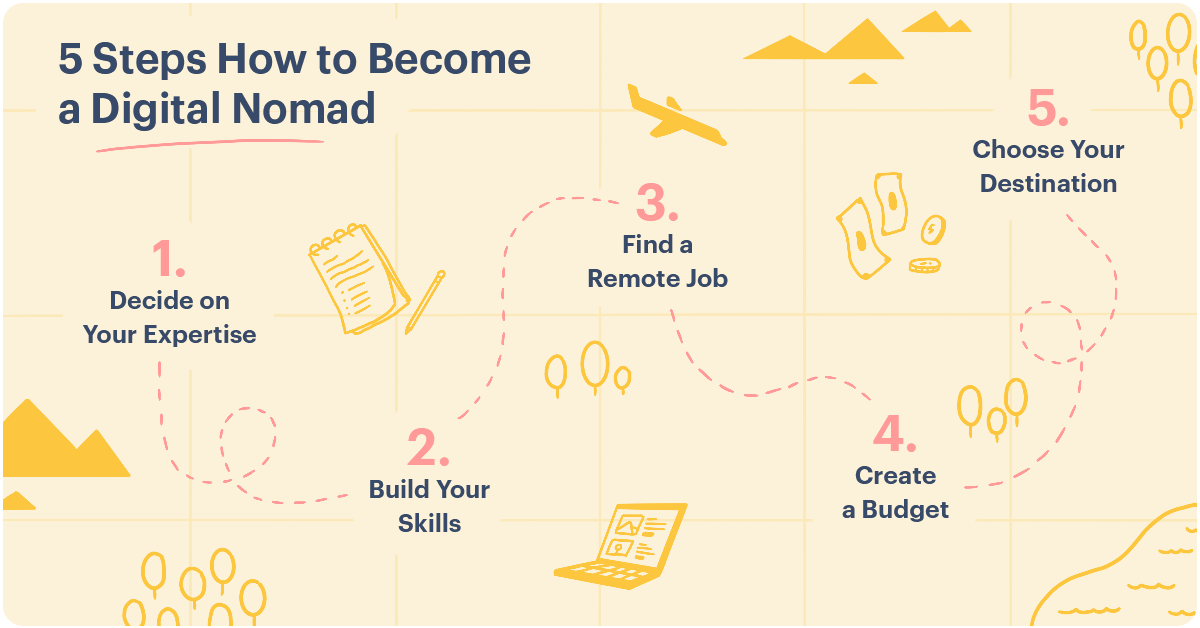Embark on a journey of flexibility and freedom with a part-time digital nomad lifestyle. This guide provides a comprehensive roadmap to transition from traditional employment to a fulfilling and rewarding nomadic experience, exploring essential skills, planning your transition, choosing the right location, setting up your workspace, managing finances, and maintaining a healthy lifestyle. It’s a journey that can be tailored to fit your unique needs and aspirations.
Whether you’re a seasoned freelancer or just starting your digital journey, this guide offers practical insights and actionable steps. From defining the digital nomad lifestyle to mastering the art of remote work, we cover all the essential elements for a successful part-time nomadic experience.
Defining Digital Nomad Lifestyle

The digital nomad lifestyle offers unparalleled flexibility and freedom, allowing individuals to work remotely from anywhere in the world. This unique work arrangement blends the benefits of traditional employment with the freedom and autonomy of entrepreneurship, providing a highly personalized and adaptable work experience. It allows for greater control over one’s schedule, location, and work-life balance.This distinct approach to work stands apart from traditional employment models and freelance arrangements by its emphasis on location independence.
While freelancers often have a fixed base of operations, digital nomads are fundamentally location-agnostic, leveraging technology to work from various locations. The key difference lies in the constant movement and exploration inherent in the digital nomad lifestyle.
Digital Nomad Work Types
Digital nomads engage in a diverse range of online work, adapting their skills and expertise to the remote environment. A wide array of possibilities exist for skilled individuals, allowing them to leverage their expertise in a variety of fields. This flexibility makes it attractive to many individuals looking for a more independent and mobile work style.
- Freelance writing, offering creative content creation for websites, blogs, and other platforms.
- Web design, encompassing the creation and maintenance of user-friendly websites.
- Online tutoring, facilitating educational opportunities for students worldwide.
- Social media management, involving content creation and engagement for businesses and individuals.
- Graphic design, creating visual content for various platforms.
These examples demonstrate the diverse skill sets applicable to the digital nomad lifestyle, showcasing the flexibility of this approach. The specific type of work often depends on the individual’s skills, interests, and desired level of independence.
Successful Digital Nomad Journeys
Numerous individuals have successfully transitioned into the digital nomad lifestyle, experiencing the freedom and rewards it offers. Their journeys often begin with a strong understanding of their skills and goals.
- A former accountant, transitioning to freelance bookkeeping, found a more balanced lifestyle while maintaining a fulfilling career.
- A graphic designer, using their skills to create logos and marketing materials for businesses across different locations, enjoyed the flexibility and autonomy of their work.
- An educator, delivering online courses to students globally, found a fulfilling and sustainable career that aligned with their passion.
These examples highlight the adaptability and diverse possibilities within the digital nomad lifestyle. They illustrate the potential for individuals with various skill sets to achieve their goals while embracing a location-independent work style.
Digital Nomadism vs. Traditional Employment
The digital nomad lifestyle presents distinct advantages and disadvantages compared to traditional employment.
| Feature | Digital Nomadism | Traditional Employment |
|---|---|---|
| Location Flexibility | High, work from anywhere with internet access | Low, restricted to a specific office location |
| Work-Life Balance | Potentially high, greater control over schedule | Potentially low, fixed hours and obligations |
| Financial Stability | Variable, dependent on income generation | Generally stable, fixed salary |
| Travel Opportunities | High, can explore new places while working | Low, limited to commute and local travel |
| Career Advancement | Potentially slower or more self-directed | Generally structured with clear career paths |
| Networking | Potentially more diverse, global network | Potentially more limited, local network |
| Challenges | Maintaining consistent income, managing remote work, potential isolation | Bureaucracy, rigid structure, limited flexibility |
This table provides a clear comparison, highlighting the contrasting characteristics of both approaches to work. Understanding these differences is crucial in making an informed decision about which path aligns best with individual goals and preferences.
Essential Skills and Knowledge
Embarking on the digital nomad journey necessitates a robust skillset and knowledge base that extends beyond technical proficiency. Success hinges on a blend of adaptability, effective communication, and time management skills, all crucial for navigating the unique challenges and opportunities of remote work. Understanding the importance of reliable internet access and leveraging the right technology are also paramount.Beyond the foundational skills, specific knowledge in various digital work areas is essential.
Project management principles, for example, are critical for freelancers effectively delivering projects, while knowledge of and content marketing is essential for those seeking to build an online presence. Continuous professional development is vital for staying current in a rapidly evolving digital landscape. This continuous learning fuels adaptation and allows for the exploration of new avenues for work and income generation.
Fundamental Skills for Success
A successful digital nomad needs a blend of essential soft skills that transcend specific roles or industries. Strong time management skills are indispensable, allowing for efficient task prioritization and adherence to deadlines. Effective communication, both written and verbal, is crucial for maintaining professional relationships and collaborating with clients and colleagues. Adaptability is paramount to navigating unexpected circumstances, changing priorities, and adapting to different work environments.
Importance of Reliable Internet Access and Technology Proficiency
Reliable internet access is the bedrock of the digital nomad lifestyle. Without consistent, high-speed internet connectivity, the majority of remote work tasks become virtually impossible. Furthermore, a solid understanding of relevant technology is crucial. This encompasses familiarity with various software programs, productivity tools, and cloud storage solutions, allowing for seamless collaboration and project management. Choosing the right devices and ensuring they are properly maintained are also important elements to consider.
Specific Knowledge in Digital Work Areas
Different digital nomad roles require specialized knowledge. Freelancers, for example, require a deep understanding of project management, enabling them to effectively plan, execute, and deliver projects on time and within budget. For those involved in online marketing, knowledge of , content marketing, and social media strategies is essential for attracting clients and building an online presence. These specializations ensure that digital nomads can effectively leverage their chosen field and excel in their roles.
Value of Professional Development
The digital nomad lifestyle necessitates continuous professional development. Staying current with industry trends, learning new software, and acquiring new skills allows for adaptation to a dynamic work environment. Participating in webinars, online courses, and industry events are crucial avenues for skill enhancement and professional growth. By investing in continuous learning, digital nomads can continually expand their skillset and explore diverse career paths.
Key Skills Needed in Various Digital Nomad Roles
| Digital Nomad Role | Key Skills | Examples |
|---|---|---|
| Freelancer | Project Management, Communication, Time Management, Adaptability | Task prioritization, client communication, project timelines, handling multiple projects simultaneously |
| Online Marketer | , Content Marketing, Social Media Marketing, Analytics | research, content creation, social media engagement, campaign tracking |
| Virtual Assistant | Administrative Support, Communication, Time Management, Organization | Scheduling appointments, managing emails, handling correspondence, organizing tasks |
| Web Developer | Coding, Design, Problem-Solving, Collaboration | HTML, CSS, JavaScript, responsive design, collaborating with clients |
Planning Your Transition

Embarking on a digital nomad journey requires meticulous planning. This phase bridges the gap between your current traditional job and the freedom of a nomadic lifestyle. A well-structured approach minimizes stress and maximizes your chances of a successful transition. Understanding the financial, legal, and logistical aspects is crucial for a smooth and fulfilling experience.Successfully transitioning to a digital nomad lifestyle necessitates a clear roadmap.
It involves careful consideration of financial resources, visa requirements, and the nuances of different locations. This proactive approach helps you navigate the complexities of the journey with confidence and avoid potential pitfalls.
Financial Planning and Budgeting
Financial planning is paramount for a sustainable digital nomad lifestyle. A comprehensive budget is essential for managing expenses in diverse locations, which may have varying costs of living. This includes not only accommodation and food but also travel, entertainment, and unexpected expenses. Effective budgeting ensures that your funds last throughout your travels.
- Establish a realistic budget: Analyze your current expenses and create a detailed budget that accounts for all anticipated costs, including accommodation, food, transportation, and activities. Factor in potential fluctuations in costs depending on your chosen locations. This includes setting aside a contingency fund for unforeseen circumstances.
- Diversify income streams: Explore options for generating income beyond your primary source. This could include freelance work, affiliate marketing, or investments. Diversification reduces reliance on a single income source, providing financial security and flexibility.
- Develop saving strategies: Create a robust savings plan to cover unexpected expenses and maintain financial stability during your travels. Consider emergency funds, travel savings, and investment strategies for long-term financial growth.
Visa Requirements and Legal Considerations
Navigating the legal landscape is critical to avoid complications while traveling. Different countries have varying visa requirements and regulations for digital nomads. Thorough research and adherence to these rules are essential for a smooth and legal stay.
- Visa research and application: Investigate the visa requirements for each country you intend to visit. Some countries offer digital nomad visas or programs that cater to remote workers. Begin the application process well in advance, considering potential delays and the complexities of international travel documentation.
- Tax implications: Understand the tax implications of your income in different countries. Consult with a tax professional to ensure you comply with all applicable tax laws and regulations. This involves understanding potential double taxation situations and taking proactive steps to mitigate them.
- Local laws and regulations: Research the local laws and regulations in your chosen destinations, including rules about working remotely, employment contracts, and intellectual property rights. Familiarize yourself with local customs and etiquette to avoid cultural misunderstandings and legal issues.
Relocation Strategies
Successful digital nomad relocations often follow a strategic approach. Planning and research are key elements in achieving a smooth transition.
- Gradual transition: A gradual transition from a traditional job to a digital nomad lifestyle can reduce stress and allow for a smoother adaptation. This may involve working part-time remotely while still maintaining your current job.
- Location scouting: Thorough research of potential locations is essential to determine the best fit for your lifestyle. Factors such as cost of living, internet access, safety, and cultural compatibility should be carefully considered. Explore different locations before committing to one.
- Networking and community engagement: Building a network of other digital nomads can provide valuable insights and support. Connecting with communities in your chosen locations can facilitate a smoother integration and provide opportunities for collaboration.
Research and Location Planning
Thorough research is crucial for choosing the right location for your nomadic lifestyle. Consider factors that will directly impact your well-being and productivity.
- Cost of living analysis: Compare the cost of living in various locations to determine which ones fit your budget. This includes accommodation, food, transportation, and utilities.
- Internet access and infrastructure: Ensure reliable internet access is available in your chosen locations. Assess the quality and speed of internet connectivity, which is vital for remote work.
- Safety and security: Evaluate the safety and security of your chosen locations. Consider crime rates, local laws, and safety precautions to ensure a secure environment.
Setting Up Your Workspace

Embarking on the digital nomad journey necessitates a flexible and adaptable workspace. This adaptability is key to maintaining productivity and comfort while traversing different locations. A well-organized and equipped workspace, regardless of its physical form, significantly impacts your overall experience and efficiency. Careful consideration of equipment, location, and security protocols are crucial for a smooth and successful transition.Establishing a dedicated workspace, even when traveling, fosters a sense of structure and routine, which is vital for maintaining focus and productivity.
This structure aids in maintaining a healthy work-life balance and enhances the overall quality of your digital nomad experience. The right tools and a thoughtfully selected environment can transform any location into a productive hub.
Essential Equipment for a Portable Workspace
A digital nomad’s toolkit should be compact and versatile. Essential items include a high-quality laptop or tablet, a reliable internet connection, a comfortable and portable keyboard and mouse, and a robust external hard drive for data backup. A portable monitor, while not always necessary, can significantly enhance productivity for those who prefer a larger screen. Consider a portable printer, particularly if you anticipate handling physical documents or need to print receipts or boarding passes.
A good quality, lightweight backpack is also crucial for carrying all your equipment safely and comfortably.
Workspace Setups for Different Digital Nomad Styles
Digital nomads adopt diverse work styles, demanding flexible and adaptable workspace setups.
- Cafes and Co-working Spaces: These environments offer a shared work atmosphere and access to high-speed internet. Cafes often provide a stimulating environment, while co-working spaces frequently offer more structured settings with access to meeting rooms and shared resources. However, these settings can be prone to distractions, requiring excellent focus and self-discipline.
- Home Offices (while traveling): Securing a temporary home office, whether through a hotel room or Airbnb, provides a dedicated space for uninterrupted work. This setting offers maximum privacy and control over the environment, minimizing distractions. However, this option may have higher costs associated with it, depending on the location and duration.
Maintaining a Comfortable and Efficient Work Environment
Maintaining comfort and efficiency while traveling is key to a successful digital nomad experience.
- Ergonomics: Prioritize ergonomic posture and equipment to prevent physical strain. Use a supportive chair, adjustable desk, and a comfortable mouse and keyboard. Regular breaks and stretching exercises are essential to maintaining physical well-being.
- Lighting and Noise Control: Optimize the lighting and minimize distracting noises. Natural light is often preferable, but artificial lighting can be used if needed. Noise-canceling headphones or earplugs can be beneficial for reducing distractions in shared workspaces.
- Organization and Routine: Establish a daily routine and maintain an organized workspace to maximize productivity. Regular cleaning and decluttering will help maintain focus and avoid feeling overwhelmed.
Digital Security and Privacy
Protecting personal data and maintaining digital security is paramount for remote workers.
- Strong Passwords and Two-Factor Authentication: Use strong, unique passwords for all accounts and enable two-factor authentication wherever possible. This adds an extra layer of security to your online accounts.
- Secure Wi-Fi Connections: Avoid using public Wi-Fi networks for sensitive transactions. If necessary, utilize a VPN to encrypt your connection and protect your data.
- Data Encryption: Encrypt sensitive files and data to prevent unauthorized access.
Comparison of Workspace Options
The following table compares different workspace options based on cost, accessibility, and atmosphere.
| Workspace Option | Cost | Accessibility | Atmosphere |
|---|---|---|---|
| Cafes | Moderate (dependent on location and drinks) | High (typically readily available) | Stimulating, but potentially distracting |
| Co-working Spaces | High (subscription-based) | Moderate (dependent on availability) | Structured, collaborative, and often equipped with resources |
| Temporary Home Offices | Variable (dependent on location and duration) | Moderate (dependent on availability and booking) | Private, controlled environment, potentially more costly |
Managing Finances and Expenses

Successfully navigating the digital nomad lifestyle hinges significantly on effective financial management. A well-structured approach to budgeting, saving, and investing is crucial for maintaining a comfortable and sustainable lifestyle while traveling the world. Careful expense minimization and income maximization are equally vital. Understanding the tax implications specific to digital nomad status in various countries is also essential for compliance and financial well-being.
Finally, establishing diverse and reliable income streams provides a safety net and allows for flexibility and growth.Financial management as a digital nomad necessitates a proactive and adaptable strategy. This involves a deep understanding of personal finances, encompassing budgeting, saving, and investment. The goal is not only to cover daily expenses but also to build a financial cushion for unexpected events and future opportunities.
This comprehensive approach fosters a sense of security and control over personal finances while enjoying the freedom of a nomadic lifestyle.
Methods for Managing Finances
Effective financial management for digital nomads encompasses a variety of strategies. These strategies are essential for maintaining a stable financial position while enjoying the freedom of location independence. Budgeting, saving, and investing are key components of a robust financial plan.
- Budgeting: A meticulously crafted budget is fundamental. It provides a clear roadmap for income and expenses, allowing for tracking and adjustments as needed. A detailed budget should incorporate all anticipated income sources and planned expenses. It should also include a contingency fund for unexpected situations. This proactive approach ensures financial stability and helps to avoid overspending or running into financial difficulties.
- Saving and Investing: A portion of income should be allocated to savings and investments. Savings acts as a safety net for emergencies and unexpected costs. Investing allows funds to grow over time, potentially increasing the financial resources available to the digital nomad. Different investment options exist, such as stocks, bonds, and real estate, each with its own level of risk and potential return.
Careful consideration of risk tolerance and financial goals is essential.
Minimizing Expenses and Maximizing Income
Maximizing income and minimizing expenses are critical for a successful digital nomad lifestyle. This requires a combination of smart choices and strategic planning.
- Expense Minimization: Strategies for minimizing expenses involve evaluating spending habits and identifying areas for potential savings. Utilizing affordable accommodations, such as hostels or Airbnb, can reduce accommodation costs significantly. Food preparation at home rather than eating out frequently can also lower dining expenses. Prioritizing free activities, such as exploring local parks or hiking, can reduce entertainment costs.
Careful comparison shopping and negotiation can also save money on various goods and services.
- Income Maximization: Maximizing income involves exploring different avenues for generating revenue. This could include freelance work, online courses, or the creation and sale of digital products. Negotiating higher rates for services or finding opportunities to work on multiple projects simultaneously can increase income. The key is to be resourceful and explore various income streams to maximize earnings.
Tax Implications for Digital Nomads
Understanding the tax implications of a digital nomad lifestyle is essential for compliance. Tax laws vary significantly from country to country, requiring careful research and consideration.
- International Tax Laws: Tax regulations concerning digital nomads are complex and vary widely across countries. A thorough understanding of the tax laws in the countries visited is crucial. Digital nomads should consult with a tax professional or utilize online resources to ensure compliance with the tax regulations of each location.
Establishing Diverse Income Streams
A diversified income stream provides greater financial stability and flexibility. This involves generating revenue from various sources.
- Multiple Income Sources: Building a diverse income stream is crucial for resilience. Exploring multiple sources, such as freelance writing, online tutoring, or selling digital products, provides a safety net and allows for adapting to changing circumstances. Diversification mitigates risks associated with relying on a single income source.
Sample Digital Nomad Budget
A well-defined budget is essential for managing finances effectively. This includes outlining income and expense categories.
| Income Category | Example Amounts (USD) |
|---|---|
| Freelance Writing | $2,000 |
| Online Courses | $1,500 |
| Expense Category | Example Amounts (USD) |
| Accommodation | $500 |
| Food | $300 |
| Transportation | $200 |
| Entertainment | $100 |
| Miscellaneous | $200 |
Maintaining a Healthy Lifestyle
Maintaining a healthy lifestyle is crucial for digital nomads, enabling them to thrive both personally and professionally during their travels. A balanced approach to physical health, mental well-being, and social connections fosters productivity, reduces stress, and ultimately enhances the overall nomadic experience. This section provides practical strategies and actionable advice for navigating the challenges and embracing the opportunities presented by this dynamic lifestyle.
Strategies for Exercise
Maintaining a consistent exercise routine while traveling requires adaptability and resourcefulness. Finding local gyms, parks, or community centers is essential. Many cities offer affordable or free workout options, such as outdoor group classes or walking trails. Utilizing readily available resources like bodyweight exercises, online workout videos, or downloadable apps can ensure physical activity even in limited spaces.
Scheduling regular exercise into the daily routine, like a morning yoga session or an evening walk, is key to consistency.
Strategies for Nutrition
Nourishing the body with healthy food choices is vital for maintaining energy levels and overall well-being. Embracing local cuisine while incorporating healthy options is a rewarding approach. Planning meals in advance and stocking up on nutritious staples can minimize impulsive choices and ensure balanced meals. Prioritizing fruits, vegetables, lean proteins, and whole grains is a simple yet effective strategy.
Utilizing meal prepping techniques can save time and reduce food waste. Exploring local farmers’ markets can provide fresh, high-quality produce and support local communities.
Stress Management Techniques
Managing stress is essential for navigating the unique demands of a nomadic lifestyle. Practicing mindfulness and meditation techniques can be highly beneficial. These practices promote mental clarity and reduce feelings of overwhelm. Setting aside dedicated time for relaxation, such as reading a book or enjoying a hobby, is vital. Taking breaks throughout the day and prioritizing downtime can help prevent burnout and maintain focus.
Engaging in activities that bring joy, such as pursuing hobbies or connecting with loved ones, can significantly alleviate stress.
Maintaining Connections with Loved Ones
Staying connected with loved ones is crucial for maintaining a healthy personal life. Utilizing video calls, instant messaging, and social media platforms enables regular communication. Scheduling dedicated time for calls or video chats with family and friends is essential to maintain emotional connections. Sending handwritten letters or care packages can add a personal touch to long-distance relationships.
Considering the time difference when scheduling calls can ensure optimal communication.
Importance of Routine and Healthy Habits
Establishing a consistent routine is vital for maintaining a healthy lifestyle. Creating a schedule that includes dedicated time for work, exercise, relaxation, and social interaction helps to structure the day and minimize stress. Building healthy habits, such as getting enough sleep, maintaining a regular meal schedule, and prioritizing hydration, is essential for physical and mental well-being. Developing a consistent sleep schedule, even while traveling, can improve mood, productivity, and overall health.
Common Challenges and Solutions
Adapting to a new environment and maintaining a sense of normalcy can be challenging. Maintaining a sense of community is vital. Joining online or local groups of digital nomads can provide support, opportunities for collaboration, and a sense of belonging. Finding reliable sources of information, such as local guides or online forums, is crucial. Building a network of supportive friends or mentors can provide guidance and support.
Healthy Habits for Digital Nomads
| Category | Habit | Description |
|---|---|---|
| Physical Well-being | Regular Exercise | Incorporating daily physical activity, such as walking, yoga, or gym sessions. |
| Physical Well-being | Balanced Nutrition | Prioritizing fruits, vegetables, lean proteins, and whole grains. |
| Mental Well-being | Mindfulness & Meditation | Practicing mindfulness and meditation techniques for stress reduction. |
| Mental Well-being | Time Management | Creating a structured daily schedule that includes work, relaxation, and social interaction. |
| Social Well-being | Regular Communication | Maintaining contact with loved ones through calls, video chats, or social media. |
| Social Well-being | Community Building | Joining local or online groups of digital nomads. |
Closure
In conclusion, becoming a part-time digital nomad is achievable with careful planning and execution. This guide has provided a structured approach, equipping you with the knowledge and skills to navigate the transition, choose the right location, manage your finances, and maintain a healthy lifestyle. Embrace the freedom and flexibility of this unique work arrangement, and unlock a world of possibilities.